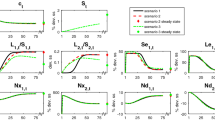Conclusions
This paper has examined the impact of trade changes on industry level wage outcomes in a bargaining framework. The results suggest that on average increases in trade, whether emanating from imports or exports, serve to decrease wage changes. This evidence is consistent with the view that foreign trade acts to moderate demand for an industry’s output and hence to discipline wage setting and is consistent with what Konings and Vandenbussche (1995) reported for UK manufacturing.
Similar content being viewed by others
References
Abowd, J. M. (1987). The Effects of International Competition on Collective Bargaining Agreements in the United States. Princeton University, unpublished.
Abowd, J. M., and T. Lemieux (1990). The Effects of International Competition on Collective Bargaining Outcomes: A Comparison of the United States and Canada. NBER Working Paper 3352. Cambridge, Mass.
Anderson, T., and C. Hsiao (1982). Formulation and Estimation of Dynamic Models Using Panel Data.Journal of Econometrics 18: 47–82.
Arellano, M., and S. Bond (1991). Some Test of Specification for Panel Data: Monte Carlo Evidence and an Application to Employment Equation.Review of Economic Studies 58 (2): 277–297.
Blundell, R., and S. Bond (1998). Initial Conditions and Moment Restrictions in Dynamic Panel Data Models.Journal of Econometrics 87 (1): 115–143.
Booth, A. (1995).The Economics of the Trade Union. Cambridge: Cambridge University Press.
Calmfors, L., and J. Driffill (1988). Bargaining Structure, Corporatism and Macroeconomic Performance.Economic Policy 6(1): 12–61.
Caves, R. E. (1990).Adjustment to International Competition: Short-Run Relations of Prices, Trade Flows and Inputs in Canadian Manufacturing Industry. Economic Council of Canada. Ottawa.
Danthine, J.-P., and J. Hunt (1994). Wage Bargaining Structure, Employment and Economic Integration.Economic Journal 104 (May): 528–541.
Denny, K., and S. Machin (1991). The Effects of Import Competition on Wages and Employment. Institute for Fiscal Studies.
Greenaway, D., R. C. Hine, and P. W. Wright (1999). An Empirical Assessment of the Impact of Trade on Employment in the United Kingdom.European Journal of Political Economy 15: 485–500.
Gregg, P., and S. Machin (1992). Unions, the Demise of the Closed Shop and Wage Growth in the 1980’s.Oxford Bulletin of Economics and Statistics 54 (1): 53–72.
Grossman, G. M. (1984). International Competition and the Unionised Sector.Canadian Journal of Economics 17 (3): 541–556.
Huizinga, H. (1993). International Market Integration and Union Bargaining.Scandinavian Journal of Economics 95 (2): 249–255.
Konings, J., and H. Vandenbussche (1995). The Effect of Foreign Competition on UK Employment and Wages: Evidence from Firm Level Panel Data.Weltwirtschaftliches Archiv 131 (4): 655–672.
Lawrence, C., and R. Z. Lawrence (1985). Manufacturing Wage Dispersion: An End Game Interpretation.Brookings Papers on Economic Activity (1):47–106.
McDonald, I. M., and R. M. Solow (1981). Wage Bargaining and Employment.American Economic Review 71: 896–908.
Naylor, R. (1998). International Trade and Economic Integration When Labour Markets Are Generally Unionised.European Economic Review 42 (7): 1251–1267.
Nickell, S., and S. Wadhwani (1990). Insider Forces and Wage Determination.Economic Journal 100 (June): 496–509.
- (1989). Insider Forces and Wage Determination. CEPR Discussion Paper 310. London.
Slaughter, M. (1999). Globalisation and Wages: A Tale of Two Perspectives.The World Economy 22 (5): 609–630.
Sorensen, J. R. (1993). Integration of Product Markets When Labour Markets Are Unionised.Recherches Economiques de Louvain 59: 485–502.
Wulfsberg, F. (1997). An Application of Wage Bargaining Models to Norwegian Panel Data.Oxford Economic Papers 49: 419–440.
About this article
Cite this article
Greenaway, D., Hine, R. & Wright, P. Further evidence on the effect of foreign competition on industry level wages. Weltwirtschaftliches Archiv 136, 522–538 (2000). https://doi.org/10.1007/BF02707292
Issue Date:
DOI: https://doi.org/10.1007/BF02707292




